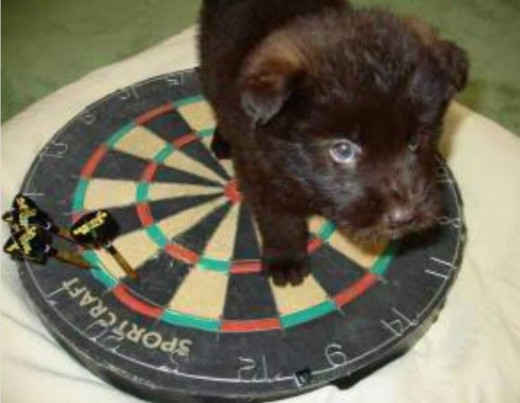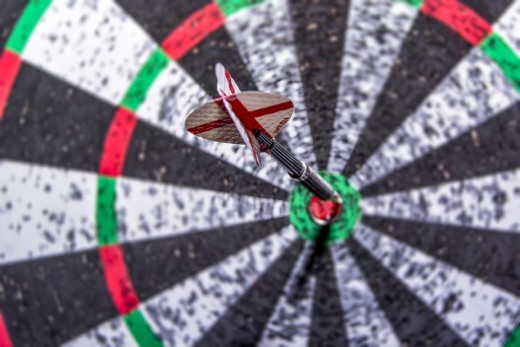February 1, 2008
Column 314
Murder on the Darts Board
Justin Irwin is his name and darts was his game – for a year – and now this most famous non-famous man in darts has written a book about his experience. Oddly entitled Murder on the Darts Board (although some might argue that Suicide on the Darts Board would be the more accurate title), this lively account was released by Portico Books on January 7 and is available everywhere books about darts are sold, which means, I guess, not widely.
I enjoyed the read. Having interviewed Irwin just after he quit his charity job as the Director of England for ChildLine, I understood early-on that his so-called quest “to become world champion in twelve month’s time” was inaccurately represented by the press. To be clear, this was never Irwin’s intention. More simply and I think respectably his goal was to take a break from the long hours, lack of appreciation and often incredible stress seldom associated with non-profit employment, except by those involved. Irwin dealt daily with matters most of us only read about, particularly child abuse.
It takes courage to pass up a regular paycheck and chase a dream. Irwin deserves credit for doing so and when few others would I gave him credit at the time.
Of course you also have to be a little bit nuts – like the guy who walked from Land’s End to John o’Groats naked, twice. We’re all a little bit nuts, just some of us are nuttier than others. Irwin’s just one of us.
Irwin’s quest was not to “become world champion within a year.” He did not say “darts was easy” or that “there is no skill” involved in the sport. He didn’t utter any of a number of other derogatory comments attributed to him by the press. He also, it is worth noting (and much to his credit), never ridiculed anyone, as many did him, for remarks they never made. Admirably, one of his detractors, Wayne Mardle, has since apologized. Others should.
Irwin is just a sports-loving bloke who needed a respite… who needed a challenge… who needed to put a little bit of fun back into his life. His aim was simply to chase a boyhood dream – a dream inspired by Keith Deller’s magical victory over Eric Bristow in 1983 – to see how good he really could become at darts if he devoted himself full-time for a full year to practicing and competing against the best. Yes, he set a goal – to qualify for the world championships. But his measure of success was not to actually qualify. Not qualifying, in his words “would not equal failure but not enjoying it would be disastrous.”
I challenge anyone to dismiss Irwin’s effort. For those who did and still do I ask you one simple question: Have you ever wondered, just for a moment, how good you could be if you devoted yourself completely to your game?
For the professionals (again, many of whom were highly critical of Irwin’s effort) the answer should be easy. Of course you have asked yourself this question. You wouldn’t be where you are today if you hadn’t asked and answered it.
For everyone else the answer should be just as easy. We all have imagined the heights we could reach. But few of us have ever really, honestly, tried. Irwin did and in the process he learned as much about himself as he did about our sport.
He started his journey by reading books and following Internet forums (notably Andy Fairclough’s Superstars of Darts). He bought a board, got some darts, joined a league and began to practice – studiously following routines he found in writings by Phil Taylor and John Part. But it didn’t go well…
Three months into his quest he was rubbish – with a three dart average of around fifty.
At six months, he was beaten by a fourteen year old kid at the Gloucestershire Open – and he was pretty much out of money.
At the end of eight months his darts were a “horror show” – and he was back to working part-time.
But he plodded on… because despite it all – from inconsistency of performance to criticism at every turn – he had fallen in love with the game.
And life was fun again.
Throughout his quest (and education) Irwin recorded a number of observations about the sport, all as brand new and sometimes fascinating to him as they are thoroughly familiar to those who have competed for years, regardless of their level of skill. Some contributed to his struggle to succeed while others, well… are just plan facts, for example:
- Practice can be boring and harmful to your arm, shoulder, neck, legs, feet, brain and relationship with your spouse.
- Follow-through is kind of, like, really important dude.
- You know you’re hooked when you start dreaming about out shots.
- Chalking is both an art and a pain in the arse.
- The sometimes earthy language of darts has an embarrassing way of seeping into everyday conversation.
- Due to some strange law of physics, 180s are often followed by crap.
- There sometimes is a mysterious force field surrounding the double one.
- Just the right amount of Guinness can remove force fields and positively impact the aforementioned law of physics.
- Too much Guinness can cause one to hug people (in Irwin’s case, Keith Deller).
Irwin makes other observations that I found insightful. Given his fresh perspective and background as a charity executive familiar with Founder’s Syndrome I found one particular observation to be spot on in its accuracy in assessing the current condition of the British Darts Organization (BDO): “Many founders don’t know when to move on, when to let someone else take over the helm. Perhaps the character traits needed to set something up – persistence, stubbornness, passion, vision – are exactly the qualities that make someone refuse to stand down.”
Irwin makes other observations which will surely rankle some, although probably none more so than the comment above will rankle Olly Croft (although he should be used to it by now and would be well served to take note).
Irwin did have his moments of excellence, as we all do, but they were infrequent. One of his was taking a leg in eighteen darts from Dennis Smith, ranked sixteenth in the world at the time. I don’t actually recall any others.
Oh yes, there was another – it was the maximum Irwin recorded in the final chapter of his unlikely odyssey, the only moment he was truly able to relish while helplessly watching his dream end at the hands of Simon Whatley at the Hull qualifiers for the PDC world championship. “The score was 5-0. Nil, nada, zero. However it is written, that’s a thrashing, a trouncing, a murder. I had certainly proved one thing. It wasn’t possible for me to qualify for the world championship in one year.”
In twelve months – after throwing an estimated 190,000 darts and walking the equivalent of seven marathons from the line to the board and back – Irwin’s quest was over.
He went home, removed his practice board from the wall and returned to his former life.
Well, not quite…
Irwin had learned a lesson or two and realized his life had changed in ways he hadn’t appreciated but in ways you and I can understand. A month after taking his board down he put it back up.
Darts had become a part of Irwin’s life. He needed to play the game. And never had his “admiration for professional darts players” been higher. He had just completed “one of the most enjoyable and varied years of my life.”
Irwin found a place where one’s education, job, bank account, race, class, age, sex or anything else matters not a whit – where darts and nothing but darts is the only qualification for acceptance…
He found the little world that you and I and millions of others already know.
Despite the early condemnation that came Irwin’s way (indeed, in the face of it) and the controversy some of his raw observations may cause among the not so thick-of-skin, his book is well worth the price of admission for anyone interested in darts.
From the Field,
Dartoid




